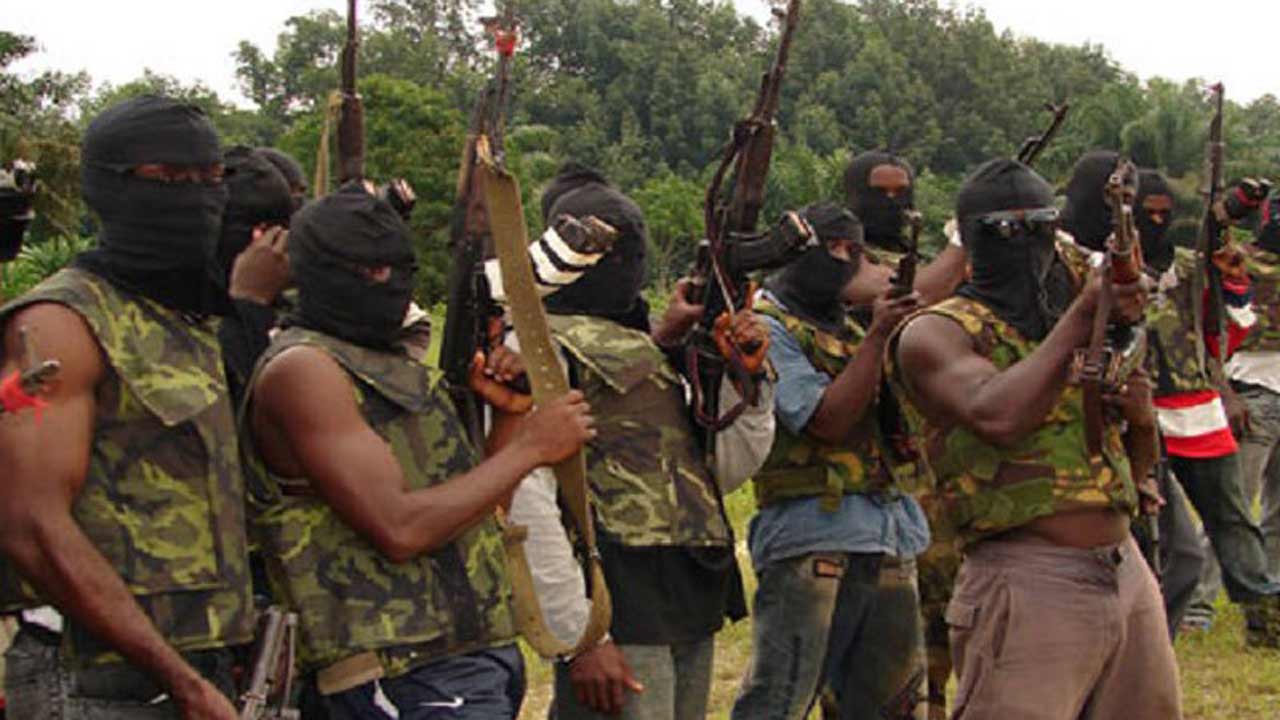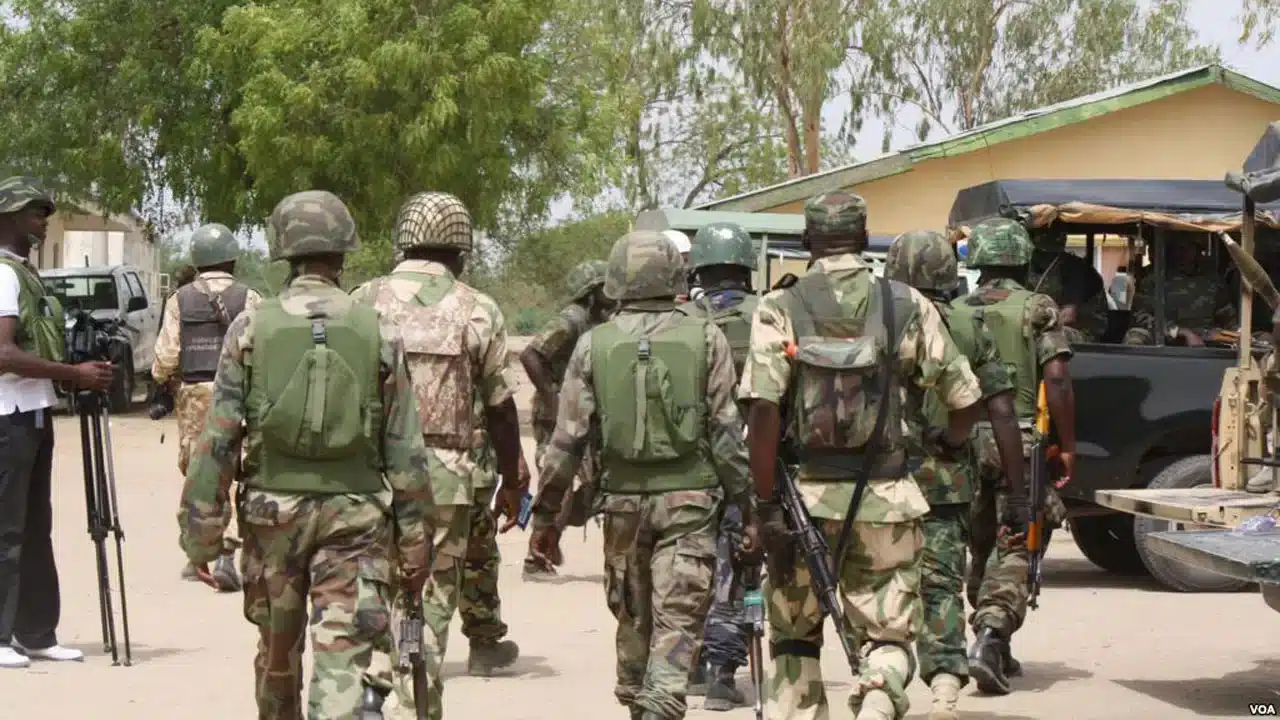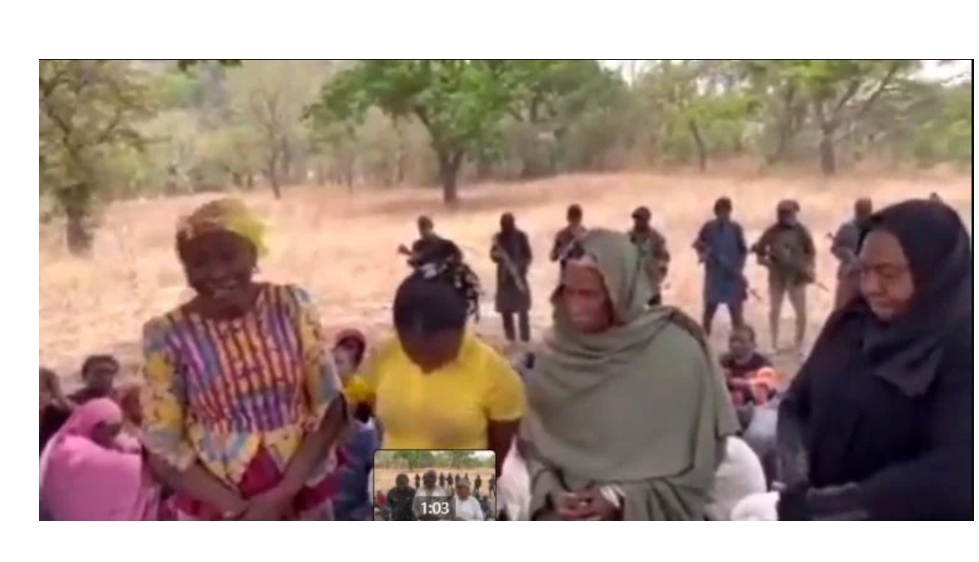Metro
Boko Haram Ambushes Soldiers, Kills Six, Injures Many

An ambush on Nigerian troops by Boko Haram elements has left six soldiers dead, 26 injured and many others still missing, PREMIUM TIMES can report.
The ambush, according to military officials briefed on the matter, occurred at about 2:30 p.m. Saturday between Jagiran and Monguno, one of the hotspot of the decade-long Boko Haram insurgency in Borno State.
The terrorists also carted away a Toyota bullet-proof Land Cruiser SUV with desert camouflage colour, belonging to the acting commander of the 3rd Armoured Division.
Army authorities fear that the vehicle could be repainted with disguise in order to gain entry into military bases.
To that end, the army has also placed the Nigerian troops in the different locations on red alert, urging them to scuttle further escalation of trouble from the terrorists if they sniff any. The police have also been notified to look out for the SUV across the country, a military source said.
The police were urged to use tact should they spot an SUV approaching their location either with mounted with a gun or not.
A spokesman of the army, Sagir Musa, did not return calls and a text message sent to him Sunday evening.
Meanwhile, last week, the Nigerian Army flagged off a manhunt for the fourth batch of wanted Boko Haram terrorists, during which they co-opted more Civilian Joint Task Force (CJTF) members into the operation.
The Boko Haram war has had a huge impact on human and economic assets in Nigeria with millions of Nigerians displaced, thousands killed and trillions sunk into the war in the past decade.
Civic group, BudgIT, estimated that Nigeria has budgeted over N8.1 trillion on security since 2015.
This year alone, N1.78 trillion was earmarked for security, with N900 billion of that going to the ministry of defence and N75 billion for military operations.
Although the Nigerian government has maintained that it has technically defeated the Boko Haram, the spate of attacks by the terrorists persists despite some successes recorded by Nigerian troops.
Premium Times
Metro
Boko Haram Members Found in Army Recruitment List, Reps Ex-Deputy Speaker Raises Alarm

A former Deputy Speaker of the House of Representatives, Ahmed Idris Wase, on Wednesday, alleged that names of Boko Haram members were once discovered on the Nigerian Army recruitment list, warning that such infiltration is undermining the country’s security architecture.
Speaking during a special plenary session of the House convened to review the national security situation, Wase said former Chairman of the House Committee on Defence, Muktar Betara, could confirm the incident.
He said the development reflects the deep flaws in Nigeria’s recruitment processes, which have allowed individuals with criminal backgrounds to enter sensitive security institutions.
Wase, who revealed that he lost both a brother and a cousin to terrorists, said the infiltration of the system explains why criminal groups continue to operate freely in many parts of the country.
He added that insecurity has become so overwhelming that his surviving younger brother begged him to help secure a transfer out of their community.
He said: “My brother, former chairman of defense, and my very good friend, Betara, will bear with me that we have moments in when in the process of recruitment, we found in the list names of criminals. Boko Haram members were found in the list of Army.
“There has to be a thorough way of ensuring that when we are recruiting, those of us who are politicians should recommend people of good character and integrity. That’s the only way we can solve this problem. You find a criminal in the system, and before you know it, whatever you do, you cannot have the problem resolved. So we must change the system and way of our recruitment.
Yes, as politicians, it’s good to recommend. This is what we are here for. But when you are recommending, please recommend people of integrity, people that will meet standards and ensure that they give the best access to our country.”
The former deputy speaker warned that Nigeria’s security crisis persists partly because some individuals benefit from the chaos, enabling criminals to move in convoys and operate with impunity.
Wase further lamented the politicisation of indigeneship and citizenship, describing it as one of the key issues dividing the country and calling for constitutional reforms to address the problem.
He noted that kidnapping has become routine, with about N5 billion reportedly paid as ransom in one year, while more than 30,000 people have been killed in Boko Haram-related attacks over time.
Wase urged lawmakers to take a holistic approach to the crisis, stressing that the scale of insecurity facing the country is more dangerous than many realise and requires urgent, coordinated action.
Metro
Kidnapped Kebbi School Girls Regain Freedom

The 24 schoolgirls abducted from Government Girls Secondary School, Maga, Kebbi state, have been rescued.
Details of the efforts that led to the rescue of the students are still sketchy at the time of this report, but an official announcement is expected tonight, according to TheCable report.
On November 17, bandits attacked the school and abducted 25 female students after killing an official and injuring a security guard.
According to a BBC report, two of the girls escaped from their captors. Quoting Hussaini Aliyu, an official from Danko Wasagu LGA, the BBC reported that the two students ran away as they were being led into the bushes by the bandits and escaped across farmland.
On November 19, Hussaini Aliyu, chairman of Danko/Wasagu LGA in Kebbi, released names of the 25 abducted schoolgirls.
The list of the kidnapped students, seen by TheCable, is organised according to their class categories.
After the incident, Bello Sani, commissioner of police in Kebbi, said additional police tactical units, alongside military personnel and vigilante groups, have been deployed in the area.
Waidi Shaibu, chief of army staff (COAS), also directed troops of Operation FANSAN YANMA to leave no stone unturned in the ongoing search-and-rescue operation for the abducted students.
President Bola Tinubu also directed Bello Matawalle, minister of state for defence, to relocate to Kebbi over the abduction of schoolgirls.
Tinubu ordered Matawalle to move to the state “to monitor security efforts to secure the release of the abducted students”.
Metro
Kwara Gov Announces Release of 38 Abducted Worshippers

Kwara State governor, AbdulRahman AbdulRazaq, has announced the release of the 38 worshippers who were abducted by bandits from the Christ Apostolic Church, Eruku.
The victims, who were kidnapped during a recent attack on the church, regained their freedom on Sunday after days of what the governor described as intense collaboration among security agencies and government authorities.
Governor AbdulRazaq attributed the successful rescue operation to what he called President Bola Tinubu’s “hands-on approach,” saying the President personally led efforts to secure the release of the abducted persons.
He disclosed that President Tinubu cancelled his scheduled trip to the G20 meeting in South Africa to focus on security breaches in Kwara and Kebbi states, adding that the President also ordered increased security deployments to the affected areas.
The Governor extended appreciation to the Office of the National Security Adviser, the Department of State Services, the Nigerian Army, the Nigeria Intelligence Agency, and the Nigeria Police Force, which recently deployed four additional tactical teams to Kwara on the President’s directive.
He also thanked security operatives, community leaders, religious bodies, and residents of Kwara State for their support throughout the ordeal.
The Christian Association of Nigeria (CAN) has strongly condemned the violent attack on Christ Apostolic Church in Eruku town, Ekiti Local Government Area of Kwara State, describing the incident as both “heartbreaking and sad.”
The attack, which occurred during a prayer service, reportedly left some worshippers dead and an unspecified number abducted, shocking the Christian community and highlighting persistent insecurity in vulnerable regions.






